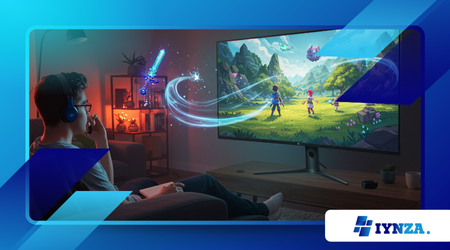How to Balance Gaming and Real Life: Tips for Gamers

Gaming is an exciting and immersive activity, but finding the right balance between gaming and real life can be a challenge.
Anúncios
Many gamers struggle to manage their time effectively, leading to negative consequences on health, relationships, and responsibilities.
Achieving balance requires self-discipline, time management, and a conscious effort to maintain a healthy lifestyle.
Understanding the Importance of Balance Gaming and Real Life
Gaming provides entertainment, social interaction, and even cognitive benefits, but excessive gaming can lead to unhealthy habits.
While playing video games can improve problem-solving skills, enhance reflexes, and provide a sense of achievement, it is essential to recognize when gaming starts interfering with daily life.
Long hours in front of the screen can result in physical strain, lack of sleep, and reduced productivity in school or work.
Many gamers experience eye strain, back pain, and fatigue due to extended gaming sessions. Additionally, excessive gaming can impact social interactions, leading to isolation from family and friends.
Recognizing the need for balance is the first step toward creating a healthier lifestyle. Being mindful of gaming habits and understanding their effects on mental and physical well-being is crucial.
By actively working on time management and setting personal limits, gamers can continue enjoying their favorite hobby without compromising their overall quality of life.
Read also: How to stream like a pro: tips for gaming content creators
Set Clear Time Limits
One of the most effective ways to balance gaming and real life is by setting time limits. Without restrictions, it’s easy to lose track of time while playing, especially in games designed to be highly engaging and rewarding.
Many games encourage extended play sessions, making it essential to set clear boundaries.
To avoid excessive gaming:
- Use alarms or reminders to signal the end of a gaming session. Setting a timer before starting a game can help maintain awareness of time spent playing.
- Establish a daily or weekly gaming schedule that allows time for responsibilities, social interactions, and relaxation. Allocating specific hours for gaming prevents it from interfering with important tasks.
- Prioritize essential tasks before gaming to ensure responsibilities are completed first. This helps create a structured routine and prevents gaming from becoming a distraction from work, school, or personal development.
By managing playtime effectively, gamers can enjoy their favorite titles without compromising other aspects of life.
Sticking to a well-defined schedule also reduces the risk of binge gaming, allowing players to appreciate their time in the virtual world while maintaining productivity in real life.
Prioritize Real-Life Responsibilities
Responsibilities such as work, school, and personal commitments should always come first.
While gaming is an enjoyable and rewarding activity, neglecting essential duties can lead to stress, missed opportunities, and difficulties in personal or professional growth.
To stay on track with real-life obligations:
- Create a to-do list to track important tasks and deadlines. Organizing responsibilities makes it easier to prioritize and manage time efficiently.
- Avoid using gaming as an escape from responsibilities or stress. While gaming can provide relaxation, excessive playtime as a coping mechanism can lead to avoidance of real-life challenges.
- Reward yourself with gaming time after completing important duties. This approach reinforces discipline and makes gaming feel like a well-earned break rather than an obligation.
By maintaining a structured routine, gamers can integrate their passion into their daily lives without letting it negatively affect their responsibilities.
Learning how to balance gaming with real-life tasks ensures that both areas complement rather than compete with each other.
Maintain a Healthy Lifestyle
A sedentary gaming lifestyle can lead to health problems if not properly managed. Sitting for long periods, skipping meals, or sacrificing sleep for gaming can take a toll on the body and mind. Maintaining a healthy lifestyle is essential for overall well-being and long-term enjoyment of gaming.
To stay healthy while gaming:
- Take regular breaks to stretch, move around, and rest the eyes. Following the 20-20-20 rule—looking away from the screen every 20 minutes for 20 seconds at something 20 feet away—helps prevent eye strain.
- Stay hydrated and maintain a balanced diet. Avoid excessive caffeine, sugary drinks, or junk food, as these can lead to energy crashes and poor concentration. Instead, opt for water, fruits, and protein-rich snacks.
- Maintain a consistent sleep schedule to prevent exhaustion. Sleep deprivation affects reaction time, concentration, and overall performance in both gaming and real life.
Balancing gaming with a healthy lifestyle improves concentration, reflexes, and mental clarity. A well-nourished body and a well-rested mind enhance gaming performance while also supporting a productive and fulfilling daily routine.
Socialize Outside of Gaming
While online gaming fosters connections with other players, it’s important to maintain real-life relationships as well. Gaming communities can be a great source of friendship and teamwork, but spending too much time in virtual interactions can lead to a lack of meaningful connections outside the gaming world.
To maintain a well-rounded social life:
- Plan social activities that don’t involve gaming. Engaging in outdoor activities, going out with friends, or spending time with family strengthens personal relationships.
- Engage in hobbies or sports to diversify interests. Exploring different activities prevents gaming from becoming the only source of entertainment and fulfillment.
- Set specific times for gaming and socializing to avoid isolation. Balancing time spent online and offline helps maintain healthy relationships and prevents feelings of loneliness.
Building strong relationships outside the gaming world creates a well-rounded lifestyle. A mix of online and real-life interactions fosters a balanced and fulfilling social experience.
Avoid Gaming Addiction
Gaming addiction is a real concern that can negatively impact mental and physical health. It’s important to recognize the signs of excessive gaming before it becomes a serious problem.
If gaming starts to interfere with daily responsibilities, relationships, or emotional well-being, it may be time to make adjustments.
Some warning signs of gaming addiction include:
- Neglecting responsibilities such as school, work, or personal hygiene due to excessive gaming.
- Losing sleep or experiencing irregular sleeping patterns because of late-night gaming sessions.
- Withdrawing from social activities and avoiding face-to-face interactions with family and friends.
- Feeling anxious or restless when unable to play, leading to irritability or frustration.
To prevent gaming addiction, set clear time limits, take breaks, and explore other interests. If gaming starts to take over life in an unhealthy way, seeking professional guidance may be beneficial that gaming remains a positive and enjoyable part of life rather than a source of stress or distraction.
FAQs
1. How many hours of gaming per day is considered healthy?
Experts recommend limiting gaming to 1-2 hours per day to maintain a balanced lifestyle and prevent negative health effects.
2. Can gaming be part of a productive routine?
Yes, gaming can be a fun and rewarding activity when balanced with responsibilities, physical activity, and social interactions.
3. What are the signs of gaming addiction?
Signs include neglecting responsibilities, losing sleep, withdrawing from social activities, and feeling anxious when not gaming.
